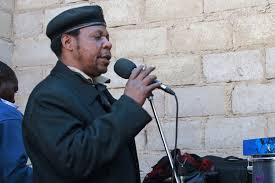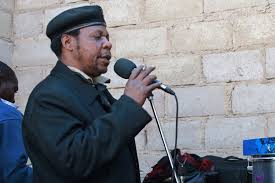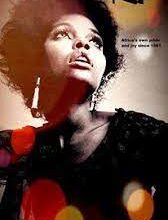Dickson “Chinx” Chingaira – Is He Not Turning in His Grave?
Walking Down The Memory Lane - Lest We Forget | Zimbabwe Legends

Chinx Chingaira

By Tapfuma Machakaire
Watching the video of the song Maruza Vapambepfumi (You have been defeated colonisers) recorded at a ZANLA base in Mozambique in 1979, one senses the excitement that rocked the camps each time the guerrillas broke into song.
The lyrics of the song sums up the colonisation of Zimbabwe with piercing sarcasm and an emphatic chorus that, “it is game over for Ian Smith and his Rhodesia Front party.” The British military commanders who accompanied General Rex Nhongo on the visit to the camp would not have been amused by the words of the song, fortunately it was in Shona a language they did not understand. Maybe to them, it was just a song in which a young guerrilla called Chinx was the lead singer.
They had no idea that the choir leader, Chinx was an irate grandson of Chief Chingaira Makoni the great military strategist of the first Chimurenga who was executed by the British settlers. The colonisers beheaded the traditional leader and took his head to England as a trophy. Could it be that the “impromptu” performance by the group was meant to demonstrate to the visitors the power of music in Zimbabwe’s war of liberation?
Studies by renowned scholars have revealed that music can inspire and entertain, but it also has powerful psychological effects that can improve health and well-being. It makes one feel motivated, happy, and relaxed. It was observed that on the road to Zimbabwe’s independence, music played an essential role of unifying the freedom fighters and the masses, at the same time raising their morale through messages that defined the purpose of the armed struggle.The war songs were inextricably linked to the hard-fought struggle and were the bedrock in boosting the morale of the fighters.
All night political gatherings that were held in war zones during the struggle referred to as Pungwes in the local Shona language have been described as a simplified model of politicisation workshops where music was used as the means to communicate the revolutionary ethos to the public. It took talented individuals to compose the poignant songs for the struggle.
Among those gifted with writing songs and performing during the war was Dickson Chingaira popularly known as comrade Chinx.
Cde Chinx in his trademark headgear, the dark coloured barrette, which he sported until his death, made a lasting impact when he led the group that performed at Rufaro stadium on the night of April 17, 1980, the day the union jack was lowered to signify the end of colonial rule in Southern Rhodesia. The climax of the act by the ZANLA People’s Choir was the song with a message to Queen Elizabeth.
The group delivered a well-choreographed piece addressing the guest, Prince Charles. The song compelled the Prince to carry a message to the Queen with the lyrics: “Prince Charlie please carry our message to the beloved Queen, that on this day, the 18th of April the people of Zimbabwe were the happiest people. We want to be very happy tomorrow. We want to be very happy every day.”
The function, which was attended by representatives from 100 countries, including 11 heads of state, also featured reggae icon, the late Bob Marley. From his rich discography, Marley had the song Zimbabwe, a special dedication to the people of the newly independent Southern African nation. The song enhanced the deserved international status of the event.
Cde Chinx and his group became the symbol of the struggle when at midnight, in absolute silence, the Union Jack was lowered from the big flagpole in the middle of the stadium and replaced by the four-coloured flag of the young state.
Before the historic celebrations Cde Chinx had become a household name with his music which was beamed from the then Maputo based Voice of Zimbabwe radio from the mid-seventies. His popularity blossomed with a tour that he undertook across the country after the ceasefire in 1979 performing at all sorts of venues. On one of the trips near the small town of Chegutu, the bus transporting the group came under a barrage of gunfire from suspected Rhodesian security forces but Cde Chinx was unperturbed and the group continued with its tour.
Cde Chinx, born Dickson Chingaira Makoni in Rusape on September 27 1955, attended Chigora Primary School in Makoni District. His school headmaster, Martin Dhlamini, who noticed his talent encouraged him to join the school choir. On completing his secondary education, Chingaira got a place to study medicine in Europe but he failed to acquire travel documents. In 1974 he worked at an engineering plant in Msasa, in Harare where he was ill-treated by his white employer. He quit and in 1975 went to join the liberation struggle in Mozambique. Chinx soon rose to a full-time organiser of the ZANLA People’s Choir.
After independence Chinx was employed by the Zimbabwe Broadcasting Corporation (ZBC) as a technical operator until around year 2000. While working for the ZBC, Chinx continued to write songs and perform during his spare time. It was then that he teamed up with Bennie Miller and Keith Farquharson in his band The Barrel of Peace and recorded his post chimurenga hits Ngorimba, Zvikomborero and Nerudo.
Professor Fred Zindi says he asked Chinx in 1982 how he reconciled his stance against whites when he was recording with white guys. His response was “We were fighting for freedom from white oppression. Now that we are free, we don’t have to fight the whites any more but to build up a relationship with them.”
Chinx became one of the early members of Ilanga with greats such as Don Gumbo (late), Busi Ncube and the late Andy Brown.
After a short stint with Ilanga he moved on to team up with Mazana Movement Band and then later with Mazana Black Spirits. His hit song Vanhu Vose VemuAfrica (People of Africa) captures the essence of humanity and unity in the face of injustice and unfairness. For this song, Chinx scooped the Silver Jubilee Award for the most inspiring song of the Liberation War at the 2005 National Arts Merit Awards.
His most outstanding hit, Roger Confirm, which became popular even with the young generation stayed on the then Radio 3 Hit pick charts for 25 weeks in 1989.
Cde Chix’s music became the preferred entertainment for all radio stations in Zimbabwe during Heroes Day, Independence Day and Africa Day holiday celebrations. In the early 90s he also got a double from MNET Africa for the movie Flame the first Zimbabwean film, since independence, based on the liberation war.
During the fast-track land reform programme which began in the year 2000 Chinx, and one of his wives, backed by the Police Band produced the Hondo Yeminda album. He did video recordings of the album around the country with ZBC producer, the late Victor Ncube, who was based at Montrose Studios in Bulawayo. In the videos Chinx had a way of communicating with viewers with an awkward gaze often followed by a skyward focus to the heavens as if he would be appealing for spiritual intervention. His performances had the powerful aura of attacking the conscience of every individual in attendance.
In August 2019, his son Sagelaw Chingaira who was poised to take over his father’s band was killed in a hit and run accident aged 26.
| His brother Lenin was part of the Urban Grooves group Slice. In October 2014 Chinx received a house in Malbereign courtesy of the Zimbabwe Music Awards(Zima) |
Cde Chinx died on June 16, 2017 at West End Hospital in Harare.While most Zimbabweans expected Chinx to be accorded national hero status, the ruling ZANU PF declared him a liberation war hero. Chinx was given the same status as the young Soul Jah Love a Zimdancehall artist who died in 2021.
Many still question why Chinx could not get the same national hero status that the late Oliver Mtukudzi got.
He was married to Catherine Mazuru who died in 1996. He remarried two wives, Patricia and Ntombizodwa, who have 10 children between them.
In an obituary Zindi wrote “The death of a great musician can create a collective sense of loss and nostalgia. It gives the feeling that an era has passed. It is in this regard that I pay my tribute to Comrade Chinx to honour and remember him for his contribution not only to this vibrant form of expression which we call music, but also for his role in the liberation of Zimbabwe.” He said even young people continue to listen to the music that he sang during the liberation struggle.
Rest in peace Shonga, Nyati the wounded Buffalo. Hopefully one day the people of Africa will unite as per your call in the masterpiece Vanhu Vese VemuAfrica which you recorded with that creative backdrop of the map of the beloved rich continent.


